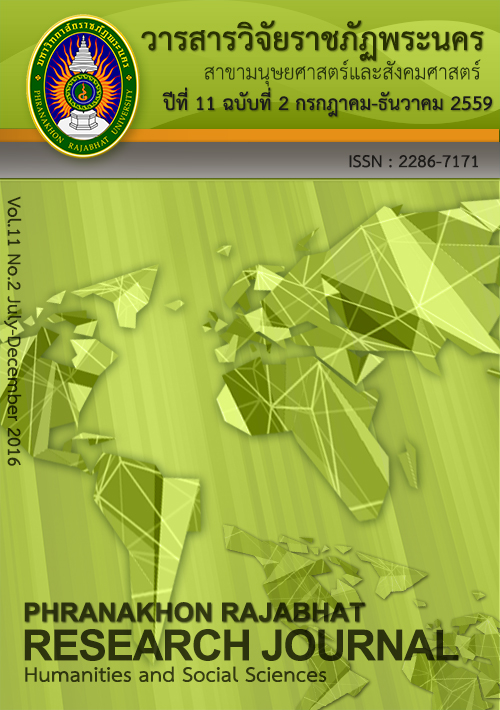ธรรมาภิบาลกับการบริหารงานด้านการประกันคุณภาพการศึกษาของมหาวิทยาลัย ในเขตกรุงเทพมหานคร
Main Article Content
บทคัดย่อ
การวิจัยครั้งนี้มีวัตถุประสงค์ เพื่อศึกษาหลักการบริหารงานตามหลักธรรมาภิบาลของมหาวิทยาลัย การมีส่วนร่วมในการประกันคุณภาพการศึกษาของบุคลากร และศึกษาการบูรณาการการบริหารงานตามหลักธรรมาภิบาลและการประกันคุณภาพการศึกษาของมหาวิทยาลัยในเขตกรุงเทพมหานคร
วิธีดำเนินการวิจัย ใช้ประชากรที่ศึกษาจากกลุ่มผู้บริหาร และบุคลากรที่ปฏิบัติงานด้านการประกันคุณภาพการศึกษาในเขตกรุงเทพมหานคร ด้วยการใช้สูตรกำหนดขนาดกลุ่มตัวอย่างของ Yamane (1993) จำนวนทั้งสิ้น 396 คน จาก 46 มหาวิทยาลัยในเขตกรุงเทพมหานคร โดยมีตัวแปรที่ศึกษาคือ ตัวแปรอิสระ ได้แก่ ข้อมูลด้านประชากรศาสตร์ (เพศ อายุ ระดับการศึกษา ประสบการณ์การทำงาน และประสบการณ์การทำงานประกันคุณภาพการศึกษา) ตัวแปรตาม (หลักธรรมาภิบาล 10 ประการ) ตัวแปรตาม (การเรียนการสอน การวิจัย การบริการวิชาการ การทำนุบำรุงศิลปะและวัฒนธรรม การบริหารงาน) โดยได้รับแบบสอบถามคืนทั้งหมด 248 ชุด จากจำนวน 400 ชุด คิดเป็นร้อยละ 62
การใช้ธรรมาภิบาลกับการบริหารงานด้านการประกันคุณภาพการศึกษาของมหาวิทยาลัยในเขตกรุงเทพมหานคร ของผู้บริหาร อาจารย์ และบุคลากร โดยรวมอยู่ในระดับปานกลาง และเมื่อพิจารณาในแต่ละหลักธรรมาภิบาลพบว่าอยู่ในระดับปานกลางทั้ง 10 หลักธรรมาภิบาล โดยเรียงลำดับค่าเฉลี่ยจากมากไปน้อย ดังนี้ หลักความเสมอภาค 3.44 หลักความโปร่งใสและหลักการตอบสนอง 3.42 หลักการมีส่วนร่วมและหลักประสิทธิผล 3.41 หลักฉันทามติ 3.40 หลักนิติธรรมและหลักการกระจายอำนาจ 3.39 ความความรับผิดชอบ 3.35 และหลักประสิทธิภาพ 3.29 ตามลำดับ
ประสิทธิผลของการนำหลักธรรมาภิบาลกับการบริหารงานด้านการประกันคุณภาพการศึกษาของมหาวิทยาลัยในเขตกรุงเทพมหานคร โดยรวมอยู่ในระดับปานกลาง และเมื่อพิจารณารายด้านพบว่า ประสิทธิผลของการนำหลักธรรมาภิบาลมาใช้บูรณาการกับการบริหารงานด้านการบริหารงาน 3.45 ด้านการทำนุบำรุงศิลปะและวัฒนธรรม 3.36 ด้านการจัดการเรียนการสอนและด้านการบริการวิชาการแก่ชุมชน 3.31 ด้านการบริหารงานวิจัย 3.23 ตามลำดับ
The objective of this research is to study the principle of good governance
management, and participation in the quality assurance of staffs and the integration of
administration related to good governance and quality assurance of universities in Bangkok.
The methodology of this study focuses on a population from the manager group
and staffs in quality assurance in universities Bangkok by using the formula, Yamane (1993),
to determine the sample size. The sample size in this paper is using 396 people from
46 universities in Bangkok. The variables studied are independent variables, including
demographic data (gender, age, education, working experience, and working experience in
quality assurance field), the variant (the ten main good governances, teaching, research,
academic community service, the arts and culture, and administration), from the returned
questionnaires 248 sets from 400 sets that was 62 percent in total.
The good governances and quality assurance administration in the university field of
managers, faculties and staffs were at a moderate level. Considering the main good
governance found that those were in the average level of ten main good governances
which are equality (3.44), transparency and response (3:42), principles involved and
effectiveness (3.41), consensus (3.40), rule of law and principle of decentralization (3.39),
responsibility (3:35), and performance standard (3.29), respectively.
Effectiveness of the good governance and quality assurance administration of the
universities in Bangkok, overall is in moderate level. The consideration in each part found
that effectiveness of the good governance for integrated in administration management
was 3.45, for integrated in arts and culture field was 3.36, for integrated teaching and
learning management and for integrated the academic community service was 3.31. for integrated of research administration was 3.23, respectively.
Article Details
บทความที่ได้รับการตีพิมพ์เป็นลิขสิทธิ์ของมหาวิทยาลัยราชภัฏพระนคร
ข้อความที่ปรากฏในบทความแต่ละเรื่องในวารสารวิจัยราชภัฏพระนครเล่มนี้เป็นความคิดเห็นส่วนตัวของผู้เขียนแต่ละท่านไม่เกี่ยวข้องกับมหาวิทยาลัยราชภัฏพระนคร และคณาจารย์ท่านอื่นๆในมหาวิทยาลัยฯ แต่อย่างใด ความรับผิดชอบองค์ประกอบทั้งหมดของบทความแต่ละเรื่องเป็นของผู้เขียนแต่ละท่าน หากมีความผิดพลาดใดๆ ผู้เขียนแต่ละท่านจะรับผิดชอบบทความของตนเองแต่ผู้เดียว


